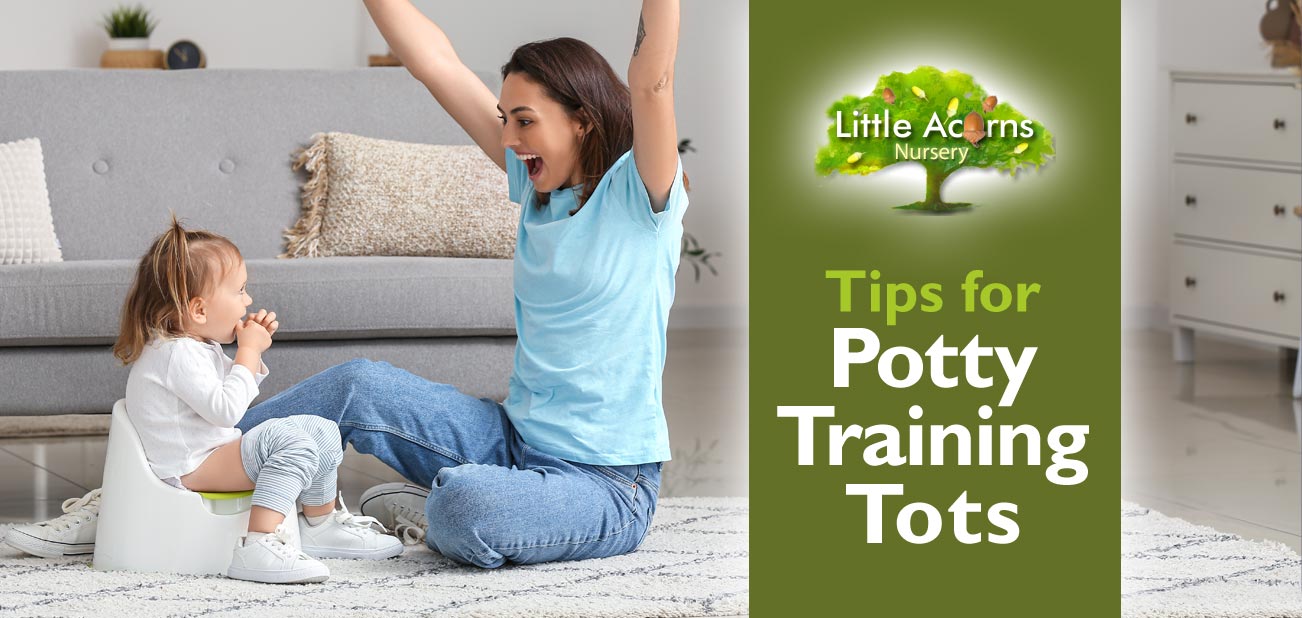
 One of the key tasks all tots must face, in tandem with parents, is potty training. It’s something we all had to master as toddlers and therefore we know it’s 100% achievable — despite it sometimes seeming to be rather a challenge. Achieving success, though, will improve the quality of life for the child, the parent, and other guardians involved in the child’s care. Learning to master the use of the potty and later the toilet will also be a major boost to self-confidence and independence when the child is at nursery, preschool, and later school. With that in mind, today’s guide outlines our top tips for successful potty training.
One of the key tasks all tots must face, in tandem with parents, is potty training. It’s something we all had to master as toddlers and therefore we know it’s 100% achievable — despite it sometimes seeming to be rather a challenge. Achieving success, though, will improve the quality of life for the child, the parent, and other guardians involved in the child’s care. Learning to master the use of the potty and later the toilet will also be a major boost to self-confidence and independence when the child is at nursery, preschool, and later school. With that in mind, today’s guide outlines our top tips for successful potty training.
First: Some Toileting Milestones
Appropriate timing for starting potty training varies from child to child and situation to situation. That said, the following are rough guidelines for the milestones for many:
- Most tots stop doing number twos at night by the age of 12 months.
- Between 2 and 3, some children become dry during the day.
- By the age of 4, most are completely dry during the daytime.
- By the age of 6, most are avoiding accidents during both the day and nighttime.
- Some children, however, may still wet the bed at night beyond the age of 5.
Children cannot help occasional accidents and may indeed be upset by them. It’s essential, therefore, not to scold them or make a fuss about such incidents.
When Should You Begin Potty Training?
 Children become ready for potty training at different times — every child is different in that respect, with some starting as early as 18 months and others not training until the age of 3. That said, the majority of little ones begin potty training between the ages of 2 and 3. There are some signs to look out for that will help parents decide when the time is right and we’ll look at those below.
Children become ready for potty training at different times — every child is different in that respect, with some starting as early as 18 months and others not training until the age of 3. That said, the majority of little ones begin potty training between the ages of 2 and 3. There are some signs to look out for that will help parents decide when the time is right and we’ll look at those below.
One of the biggest clues that a child is ready to begin potty training is when they become obviously aware of what’s in their nappy. They may, for example, take a peak when being changed, or make it clear they are not comfortable when in need of a change. It could also be as simple as indicating that they are aware when they’re going to the loo in the nappy. Some children may show this by going somewhere quiet and more private when going. Others may do the opposite and make strong eye-to-eye contact with a parent as if to let them know that something is afoot! Such awareness may be key to starting potty training.
Children may also take a lead from parents/relatives or even other children:
A 2½-year-old, who had begun potty training, recently wanted to sit on the “big boy’s toilet” because he’d seen slightly older children doing so at nursery. This was a toileting turning point following what had been, until then, quite a challenging process. (Anecdote from a parent)
There are some practical considerations too. For example, quite a few parents will begin potty training in the warmer months of the year. At such times, there will be fewer clothes worn by children day-to-day, less, therefore, to wash if an accident happens, and likely a working washing line outside to dry everything on. So, by starting during the summer, you can cut down on the workload and potentially save on water and energy.
Encouragement
 Ensuring children understand the language around toileting is helpful, of course. So, it’s healthy to help children learn the various terms involved, whether talking about a potty, wee-wees, or anything else. Learning appropriate words will empower children to ask for what they need, at appropriate times.
Ensuring children understand the language around toileting is helpful, of course. So, it’s healthy to help children learn the various terms involved, whether talking about a potty, wee-wees, or anything else. Learning appropriate words will empower children to ask for what they need, at appropriate times.
Getting them involved when shopping for toileting products may also give them a deeper interest in potty and toilet training. For example, they may like the look of a potty with a dinosaur on it, or perhaps one featuring their favourite TV character. Other children may like the idea of one of those potties that plays a song when it’s been successfully used.
If there are challenges, families can often get some great success using a reward system. When the youngster successfully uses the potty, they could be awarded a sticker on a colourful, fun-looking potty training chart. Such things are available commercially if you do a quick web search. Another type of reward to be used sparingly could be to award the child a piece of their favourite snack when successful. There’s no doubt this works as an incentive for some little ones.
Another method of encouraging toddlers to use the potty is to walk the child to the potty every 30 to 60 minutes to see if they’re ready to go. The length of time between visits can be gradually extended once that’s working. Visits to the potty are also wise before and after bedtime, following daytime naps, and immediately after mealtimes.
Potty Training/Toileting Aids
Various toileting aids may help with potty and toilet training. Examples include:
 Potties with designs that are attractive to toddlers e.g. dinosaurs, licensed TV characters etc.
Potties with designs that are attractive to toddlers e.g. dinosaurs, licensed TV characters etc.- Musical potties where a sing-along song is activated on successful use.
- Portable travel potties — some look like a child’s travel case.
- Clip-on trainer seats, which attach to adult toilets.
- Steps to help children reach trainer seats attached to toilets, also allowing them to reach the sink to wash hands afterwards.
- Pretend toilets and potties that children can use to ‘toilet train’ their own dolls and toys. Such activities can greatly encourage little ones in their own toilet training.
- ‘Pull-ups’, which are somewhere between nappies and pants/knickers. These may be useful early on or when a child still has occasional accidents but no longer wears nappies.
- Interestingly, toilet training-themed videos, books, games and songs can also be useful tools to encourage little ones when toilet training as they ‘normalise’ the process.
More Tips for Potty Training Success
 Only start potty training when your child shows signs that they’re ready. (See the When Should You Begin Potty Training? section above for details).
Only start potty training when your child shows signs that they’re ready. (See the When Should You Begin Potty Training? section above for details).- It’s best to start during a quiet time, so there are no distractions.
- Set a potty training schedule and try to stick to it, so you’re consistent in your message.
- Try to ensure that your potty training schedule does not conflict with your child’s existing routines.
- Make potty training fun! (See the Encouragement section above for ideas).
- Let your child choose their own potty at the store.
- Buy more than one so you have one in each bathroom/cloakroom and a travel potty.
- Keep a potty in the bathroom and encourage your little one to use it (or initially even just sit on it) when you pay a visit yourself.
- Reward your child when successful. Sticker books using fun stickers and a colourful toileting chart can work wonders, for example.
- Praise your child and their output – it will encourage them.
- Accidents will happen but don’t make a fuss when they do. Potty training needs to be as stress-free as possible for little ones.
- Last but not least, remember to encourage good hygiene in your toddler, through handwashing etc.
We hope that our potty training tips are useful and help your child transition smoothly. As we said before, success will lead to more self-confident, independent, and happy children. What’s more, it will also improve the quality of life for parents and caregivers.
An Outstanding Childcare Service in Central Lancashire
We are an outstanding nursery in Clayton-le-Woods, Chorley


We are an outstanding nursery in Clayton-le-Woods, near Chorley and offer babies and children under five the very best start in life in a warm, nurturing, home-from-home environment. We also support a range of Government-funded hours and childcare schemes for eligible families. If you’d like to explore a possible childcare place for your child in perhaps the best nursery in Central Lancashire, please get in touch:
As well as being perfectly located for babies and children under five in Clayton-le-Woods (PR6) and Chorley, Little Acorns Nursery is also convenient for those requiring childcare in nearby towns and villages. These include Clayton Brook, Clayton Green, Thorpe Green, Pippin Street, Buckshaw Village, Whittle-le-Woods, Farington, Bamber Bridge, Lostock Hall, Euxton, Leyland and Penwortham.


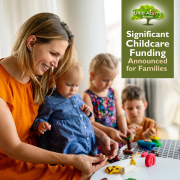
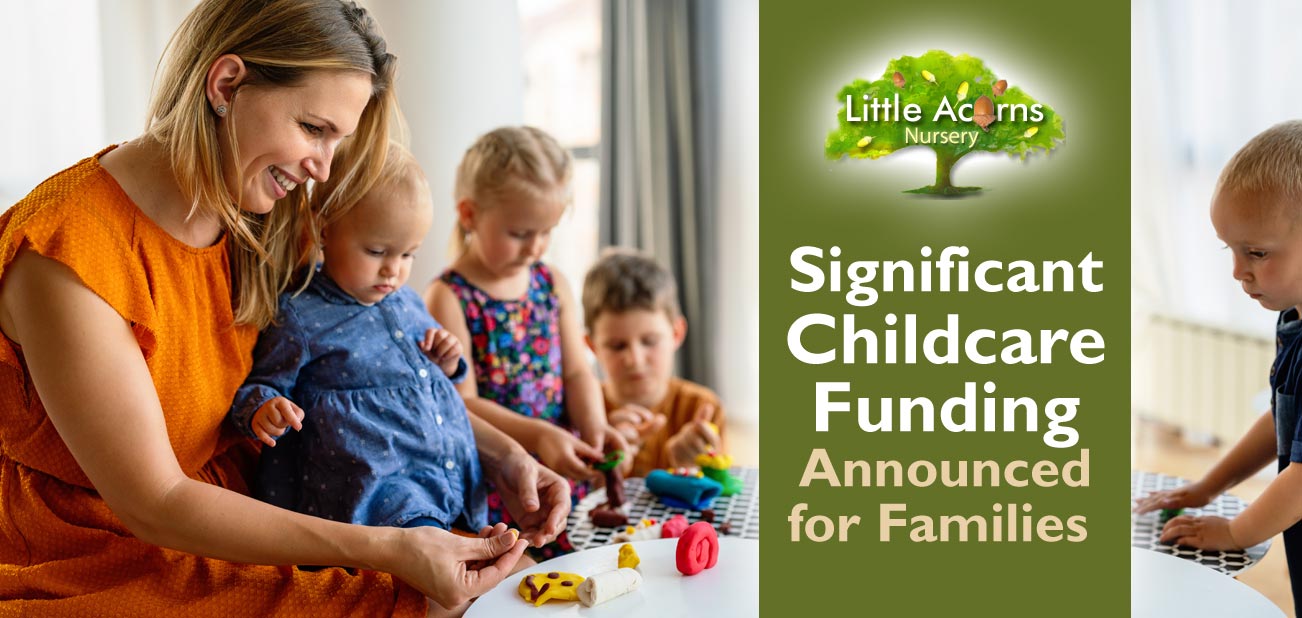
 parents to return to the workplace sooner after the birth of their child if they so choose;
parents to return to the workplace sooner after the birth of their child if they so choose; children aged 2 from eligible working families will be able to claim 570 hours of free childcare each year. This is typically taken as 15 hours of free childcare each week over 38 weeks, although exactly how it’s taken may be agreed otherwise between the family and the childcare provider.
children aged 2 from eligible working families will be able to claim 570 hours of free childcare each year. This is typically taken as 15 hours of free childcare each week over 38 weeks, although exactly how it’s taken may be agreed otherwise between the family and the childcare provider. Until now, 87% of those eligible to claim childcare support through Universal Credit were not doing so. One of the main reasons for this was that it’s geared towards low-income families yet required them to pay childcare fees in advance — and later claim them back. Paying in advance is not so easy when household income is low, as is typically the case for households that would otherwise be eligible. For this reason, another of the Chancellor’s initiatives announced in the Spring Budget 2023 is to roll out the following improvements:
Until now, 87% of those eligible to claim childcare support through Universal Credit were not doing so. One of the main reasons for this was that it’s geared towards low-income families yet required them to pay childcare fees in advance — and later claim them back. Paying in advance is not so easy when household income is low, as is typically the case for households that would otherwise be eligible. For this reason, another of the Chancellor’s initiatives announced in the Spring Budget 2023 is to roll out the following improvements: The final childcare-related initiative in the Chancellor’s Spring Budget aims to fix another key problem for parents: how to juggle their own longer working hours with their child’s shorter school hours. When a child attends school, they often finish their school day several hours before their parent is finished at work, for example. There is therefore a childcare requirement to bridge the gap and this may be required both at the start and end of the child’s school day. In view of this, the Chancellor announced the piloting of a new Wraparound Pathfinder Scheme, which would fund childcare hours from 8 am until the start of the school morning and, later in the day, fund childcare for the mismatched afternoon hours up to 6 pm. The pilot will test the scheme to see how well it works. If successful, the Chancellor aims to roll it out to the whole of the UK from September 2024.
The final childcare-related initiative in the Chancellor’s Spring Budget aims to fix another key problem for parents: how to juggle their own longer working hours with their child’s shorter school hours. When a child attends school, they often finish their school day several hours before their parent is finished at work, for example. There is therefore a childcare requirement to bridge the gap and this may be required both at the start and end of the child’s school day. In view of this, the Chancellor announced the piloting of a new Wraparound Pathfinder Scheme, which would fund childcare hours from 8 am until the start of the school morning and, later in the day, fund childcare for the mismatched afternoon hours up to 6 pm. The pilot will test the scheme to see how well it works. If successful, the Chancellor aims to roll it out to the whole of the UK from September 2024.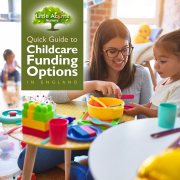
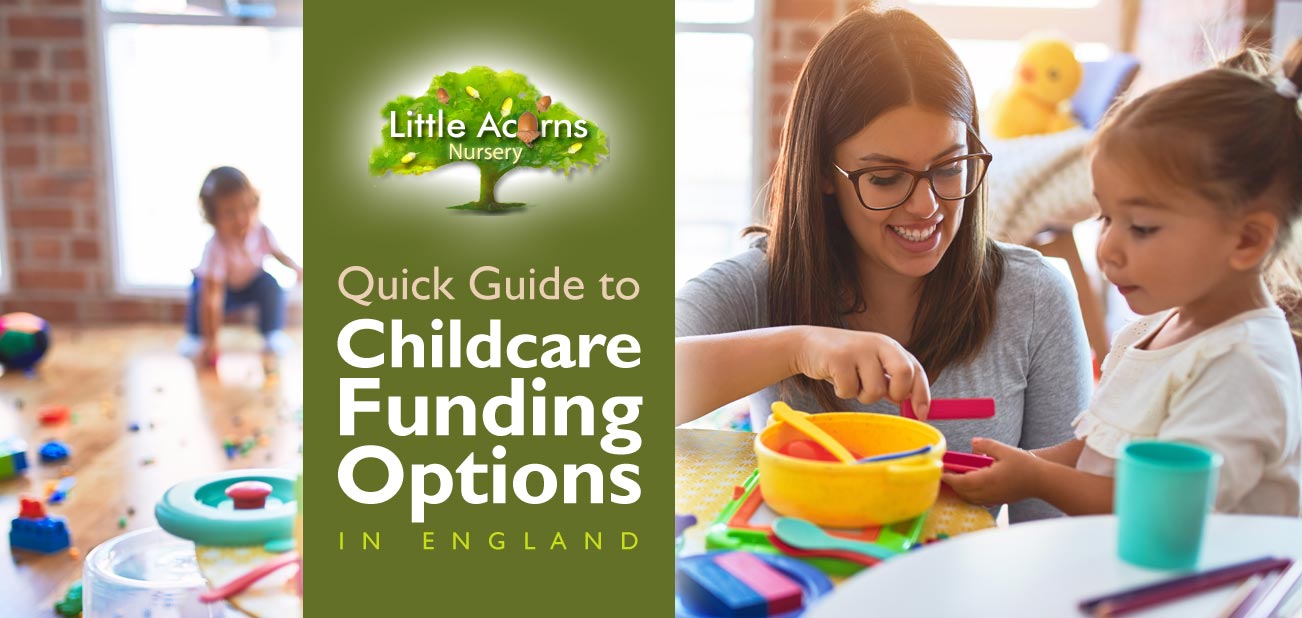
 One of the first challenges when considering childcare for your little one is how to fund it. If you’re an affluent family, then great. However, if childcare costs will be a more significant hurdle to overcome, the good news is that there are lots of options available. Either way, it will help to be well-informed about the various childcare funding schemes on offer from the Government. There are quite a few of them and some are extremely generous and surprisingly easy to obtain. Today’s Quick Guide to Childcare Funding Options in England will give you an at-a-glance overview of what’s available, the key eligibility criteria and how to apply. Note, though, that they generally fund in-person childcare only from approved providers (like Little Acorns). Take a look at the many options …
One of the first challenges when considering childcare for your little one is how to fund it. If you’re an affluent family, then great. However, if childcare costs will be a more significant hurdle to overcome, the good news is that there are lots of options available. Either way, it will help to be well-informed about the various childcare funding schemes on offer from the Government. There are quite a few of them and some are extremely generous and surprisingly easy to obtain. Today’s Quick Guide to Childcare Funding Options in England will give you an at-a-glance overview of what’s available, the key eligibility criteria and how to apply. Note, though, that they generally fund in-person childcare only from approved providers (like Little Acorns). Take a look at the many options … You’ve no doubt heard of, or read about, childcare ‘vouchers’. They sound great, but what are they and how do you get them?
You’ve no doubt heard of, or read about, childcare ‘vouchers’. They sound great, but what are they and how do you get them? Tax-Free Childcare is a great scheme which, in contrast to childcare vouchers, is widely available to working families — even for those with relatively high earnings.
Tax-Free Childcare is a great scheme which, in contrast to childcare vouchers, is widely available to working families — even for those with relatively high earnings. Certain 2-year-olds are eligible for 15 hours of free childcare each week, through another Government scheme. This one is to help primarily those families on benefits.
Certain 2-year-olds are eligible for 15 hours of free childcare each week, through another Government scheme. This one is to help primarily those families on benefits. 3 and 4-year-olds in England are very well catered for when it comes to free childcare funding. This is aimed to help them receive that all-important early years education and to help those parents wishing to return to the workplace.
3 and 4-year-olds in England are very well catered for when it comes to free childcare funding. This is aimed to help them receive that all-important early years education and to help those parents wishing to return to the workplace. Tax Credits specifically for childcare are only available to existing claimants under the scheme, through ‘Working Tax Credits’. New claimants should instead refer to the ‘Childcare Funding through Universal Credit’ section below.
Tax Credits specifically for childcare are only available to existing claimants under the scheme, through ‘Working Tax Credits’. New claimants should instead refer to the ‘Childcare Funding through Universal Credit’ section below. For those who are eligible, this is quite a generous scheme that allows them to reclaim* as much as 85% of their childcare costs. The maximum available, however, is £646.35* each month for one child, or it’s £1108.04* for more than one.
For those who are eligible, this is quite a generous scheme that allows them to reclaim* as much as 85% of their childcare costs. The maximum available, however, is £646.35* each month for one child, or it’s £1108.04* for more than one. This is a grant that does not need to be repaid and is in addition to any undergraduate Student Finance.
This is a grant that does not need to be repaid and is in addition to any undergraduate Student Finance. Learner Support is a type of financial support designed for students who are suffering financial hardship. It can be used to fund childcare for eligible students who are also parents.
Learner Support is a type of financial support designed for students who are suffering financial hardship. It can be used to fund childcare for eligible students who are also parents. Care to Learn may suit if you are a parent who is not yet 20 and are studying on a publicly-funded course, although see caveats below.
Care to Learn may suit if you are a parent who is not yet 20 and are studying on a publicly-funded course, although see caveats below.